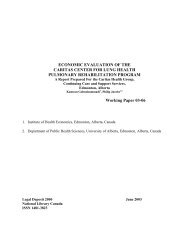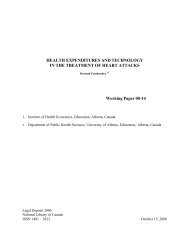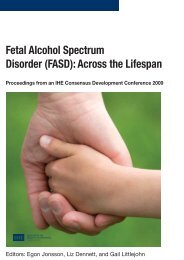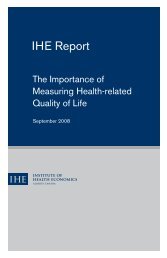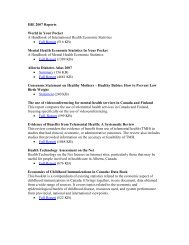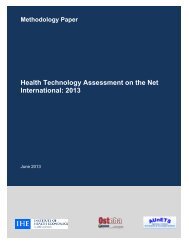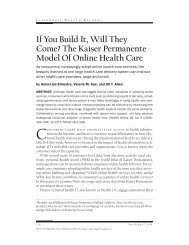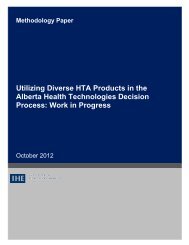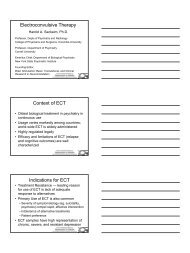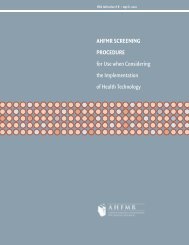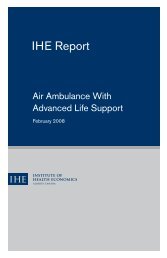Bariatric treatments for adult obesity - Institute of Health Economics
Bariatric treatments for adult obesity - Institute of Health Economics
Bariatric treatments for adult obesity - Institute of Health Economics
- No tags were found...
Create successful ePaper yourself
Turn your PDF publications into a flip-book with our unique Google optimized e-Paper software.
PharmacotherapyPharmacotherapy can be <strong>of</strong>fered to overweight or obese patients who have failed to achieve ormaintain their weight-loss goals through dietary therapy and physical exercise. The decision toprescribe anti<strong>obesity</strong> drugs requires a careful assessment <strong>of</strong> the risks and benefits. The averageamount <strong>of</strong> weight lost is modest, and most patients will remain significantly obese or overweighteven with drug therapy. Furthermore, currently-available anti<strong>obesity</strong> drugs are costly, each drug hasassociated adverse effects, and the ultimate effect on cardiovascular morbidity and mortality remainunknown.Since near-maximal weight loss was usually achieved by three to six months in most trials, drugtherapy should be discontinued at this point if significant weight loss has not occurred.There appear to be no definitive data demonstrating that one particular drug is clearly moreefficacious than another, there<strong>for</strong>e, initial drug selection can be guided by factors such as (1) patientpreference, (2) local cost, availability, and drug plan coverage, and/or (3) patient comorbidities andthe adverse effect pr<strong>of</strong>iles.<strong>Bariatric</strong> surgeryOf the three surgical procedures provided in Alberta, RYGB appears to be more effective than AGBin reducing weight, but is associated with a higher risk <strong>of</strong> adverse events. Clinical research evidencewas limited <strong>for</strong> sleeve gastrectomy. Preferences <strong>of</strong> the patient and experiences <strong>of</strong> the surgeon mayinfluence the choice <strong>of</strong> surgery.ConclusionEvidence from randomized controlled trials assessed in the 14 recently published systematicreviews/HTAs suggests that all dietary therapy, physical exercise, behavioural therapy,pharmacological therapy, and bariatric surgery are effective, to varying degrees, in reducing weight inoverweight or obese <strong>adult</strong>s over the short term.In<strong>for</strong>mation is lacking on the adverse events associated with the use <strong>of</strong> dietary therapy, physicalexercise, and behavioural therapy. Of the two anti<strong>obesity</strong> drugs approved by <strong>Health</strong> Canada <strong>for</strong>long-term use, gastrointestinal tract side effects are common, with orlistat and sibutramine increasingheart rate and blood pressure. Of the three surgical procedures currently per<strong>for</strong>med in Alberta,evidence <strong>for</strong> sleeve gastrectomy was limited. Compared to RYGB, AGB is associated with shorterhospitalization, and a lower risk <strong>of</strong> early wound infection, late hernia, and stenosis, but a higher risk<strong>of</strong> late slippage or dilatation and late reoperation.Compared with standard care, dietary therapy significantly reduced body weight, body mass index,waist circumference, blood pressure, blood lipids, and blood glucose levels in overweight or obesepeople. There appeared to be no differences between the different types <strong>of</strong> diets.Physical exercise is effective in reducing weight, particularly when combined with dietaryinterventions. Exercise is also an effective intervention <strong>for</strong> improving various risk factors even whenweight loss does not occur.Available evidence suggests that overweight or obese <strong>adult</strong>s benefit from behavioural and cognitivebehaviouraltherapies that enhance weight reduction. Behavioural therapy is particularly useful whencombined with dietary and exercise strategies, which resulted in weight loss as well as reductions <strong>of</strong>blood pressure, fasting plasma glucose, serum cholesterol, and triglycerides.<strong>Bariatric</strong> <strong>treatments</strong> <strong>for</strong> <strong>adult</strong> <strong>obesity</strong> 99



